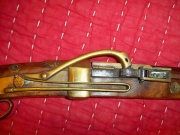Snap matchlock
The Snap Matchlock is a type of matchlock mechanism used to ignite early firearms. It was used in Europe from about 1475 to 1640, and in Japan from 1543 till about 1880.[1]
The serpentine (a curved lever with a clamp on the end) was held in firing position by a weak spring[2], and released by pressing a button, pulling a trigger, or even pulling a short string passing into the mechanism. The slow match held in the clamp swung into a flash pan containing priming powder. The flash from the flash pan travelled through the touch hole igniting the main propellant charge of the gun. As the match was often extinguished after its relatively violent collision with the flash pan, this means of ignition fell out of favour with soldiers, but was often used in fine target weapons.
The technology was transported to Japan, where it became known as the Tanegashima, in 1543 by the Portuguese[3] and flourished there until the 1900s. The Japanese Matchlock, or Tanegashima seems to have been based on snap matchlocks that were produced in the armory of Goa India, which was captured by the Portuguese in 1510.[4]
[edit] See also
[edit] Notes
- ↑ Richard J. Garrett. "The defences of Macau: forts, ships and weapons over 450 years", Hong Kong University Press 2010. ISBN 9888028499, P.176
- ↑ Claude Blair, "European & American arms, c. 1100-1850" B. T. Batsford, 1962. Original from Pennsylvania State University, Digitized Jun 30, 2009. P.42
- ↑ Olof G. Lidin, "Tanegashima: the arrival of Europe in Japan". Nordic Institute of Asian Studies, NIAS Press, 2002. P.1-14]
- ↑ The bewitched gun : the introduction of the firearm in the Far East by the Portuguese, by Rainer Daehnhardt 1994 P.26
